The problem is not just the dictatorship—it’s also the deception that sustains it.
The March 28 Sagaing earthquake in Myanmar struck a nation already in a polycrisis. But while the ground shook, so too did the political dynamics—shaken by manipulation.
What followed was not just disaster response. It became a disaster deception. How did the Myanmar junta exploit the catastrophe to re-enter diplomacy, distort reality and derail a people-led revolution?
The disaster
The earthquake happened on top of a brutal conflict and multiple forms of suffering of the Myanmar people. Before the earthquake, Myanmar was already the most vulnerable country in the region. Nearly half of Myanmar’s population was living below the poverty line. The earthquake has intensified a polycrisis, pushing people’s negative resilience to the brink.
The Sagaing earthquake was both completely expected (the location and magnitude), and completely unexpected (the timing). The earthquake along the Sagaing Fault was not a surprise. It was a known inevitability—a highly active fault with a long history of major seismic events. The science was clear. The timing was unknown, but the risk was certain. It was a predicted disaster, waiting to happen.
The coup four years ago, especially, and decades of political turbulence disrupted disaster governance. Ongoing conflict diverted attention and resources away from hazard mitigation. Communities already displaced by conflict now face further trauma and risk. People’s ability to prepare was constrained by economic hardship, insecurity and fear. This is not just a natural disaster. This is a catastrophe of militarized neglect.
The dictatorship
Before the earthquake, Myanmar’s resistance was gaining ground—expanding territorial control, consolidating parallel governance and interim state structures, and building global solidarity. The junta was visibly losing grip. But the diplomacy brought the military in from the cold, re-entering the room as if it were a legitimate and indispensable partner in disaster response and recovery coordination and the gatekeeper of humanitarian access. Meanwhile, the junta continued its indiscriminate airstrikes and ground artillery shelling, proving once again that its ceasefires are camouflage, not commitment.
The international response fell into what Mac Ginty calls “recentism”—focusing narrowly on the most current event, in this case the Sagaing earthquake, while disregarding the deeper historical, political and structural roots of the crisis. The earthquake was treated as a neutral event in a political vacuum, ignoring the junta’s long record of betrayal, notably the defunct Nationwide Ceasefire Agreement; blatant disregard for the Association of Southeast Asian Nations (ASEAN)’s Five-Point Consensus; and ongoing indiscriminate attacks during self-declared ceasefires. What we’re seeing is aid washing, where war crimes are downplayed and reduced as disaster urgency.
Despite its collapsing internal legitimacy, the junta continues to be treated as the spine of the state. In reality, it is an increasingly isolated faction, dominated by a narrow Bamar elite. It does not even command the loyalty of the Bamar majority anymore. The people’s revolution has outgrown the junta—but the international system has not caught up. Treating the junta like a state while the people build a nation is a tragic mismatch.
The deception
The junta’s post-disaster pivot sets the stage for what can only be called a Potemkin democracy—a carefully crafted illusion of legitimacy through the announcement of elections. This isn’t a democratic transition. The military has done this before: selective elections, staged inclusivity and promises of progress for fatigued foreign diplomats. What’s being offered now is not a pathway to peace—it’s theatrics of stability designed to stall international pressure, divide the resistance and resurrect the junta’s oppressive control—thus perpetuating the circle of violence.
Engagement without clear red lines is not solidarity. It’s complicity. Without red lines, engagement becomes an open invitation to impunity. Unconditional engagement allows the junta to write the script, cast the characters, and direct the entire show. It silences the people’s revolution and turns principled neutrality into performative neutrality. When aid and diplomacy walk onto the junta’s stage without challenge, solidarity becomes complicity.
Some argue that engagement with the junta is necessary to obtain access. But there is a difference between negotiating for humanitarian entry with clear red lines and letting the regime rewrite the rules of engagement. Besides, there are better alternatives: community-led responses, ethnic service networks and resistance humanitarians who have long filled the void the junta created. Access without accountability only deepens injustice. Dealing with the devil for access is one thing. Handing him the pen to rewrite the story—that’s complicity.
What must be done?
ASEAN and the wider international community must confront a difficult truth: continued engagement with the junta without accountability risks enabling a regime responsible for atrocity crimes. They must respond in a way that reflects the realities on the ground and stands with the people of Myanmar, not their oppressors.
This means refusing to rehabilitate the junta’s image through humanitarian channels. The military junta should not be treated as the sole gatekeeper for aid, recovery or coordination. Doing so falsely presents the junta as a stabilizing force, when in fact it continues to bomb, starve and displace its own population.
Instead of supporting the junta, the international community should support community-led and resistance-administered aid networks. That includes ethnic service providers, local responders and resistance humanitarians, who are already delivering aid and protection in areas outside junta control. These actors must be recognized, funded and prioritized. Partnerships should be directed toward interim governance structures, civil society networks and border-based humanitarian channels trusted by the communities they serve.
Parallel approaches are dangerous, but if used, strong firewalls must be built. In contexts where dual-track operations are unavoidable, strict separation between junta-facing aid and support to resistance-held areas must be both designed and rigorously implemented. Robust firewalls—operational, informational and personnel-related—are essential to prevent compromise, leakage or retaliation. Covert support to resistance-controlled areas must be protected and resourced, with staff kept on a strict need-to-know basis.
All humanitarian access must be unconditional and unrestricted—whether the affected areas are under the control of the junta, the National Unity Government or ethnic resistance organizations—without interference, restriction or accompaniment by armed actors. All engagement must be conditioned on full compliance with international humanitarian law, including the protection of civilians and aid workers. Engagement must be suspended if red lines are crossed, especially continued airstrikes and ground attacks on civilians and their infrastructure. Humanitarian convenience cannot override moral and legal accountability.
Mechanisms to monitor ceasefire violations and aid obstruction are also crucial. Independent monitoring mechanisms—formal or informal—must be established and supported to track ceasefire violations, aid blockages and attacks on civilians. These mechanisms can be enhanced by satellite imagery, diaspora reporting and partnerships with resistance networks to ground-truth and verify conditions on the ground. Findings must be published—silence enables impunity. While the military junta is the major perpetrator and must be held accountable by international law, all conflict parties must honour ceasefire pledges, refrain from aid obstruction, and end attacks on civilians and humanitarian personnel. Above all, the junta must stop the airstrikes and ground shelling.
The junta is exploiting the earthquake in an attempt to gain legitimacy and support for its “election”. The international community must publicly denounce the junta’s electoral plans as illegitimate, non-inclusive and non-representative. It must refuse to provide observers, technical support or any form of endorsement to military-organized elections.
Similarly, junta representatives must be excluded from regional and global platforms. ASEAN and the broader international community must center resistance actors, ethnic leaders and grassroots responders in all regional and international forums. Continued inclusion of junta-linked or military-appointed representatives in multilateral forums only serves to whitewash atrocity crimes. The credibility of regional diplomacy can only be restored by listening to the people rebuilding the nation from the ground up.
Disaster struck Myanmar. But so did deception. The junta exploited the earthquake. The world handed it a spotlight. Will the international community continue to play along in the junta’s theatre of control? Or will it finally walk off the stage, reject the script and stand—firmly and clearly—with the people rewriting their future from the ground up? Regardless, the resistance will continue, and the people’s revolution will prevail.
Adelina Kamal is an independent analyst, a steering committee member of the Southeast Asian Women Peace Mediators and the former executive director of the ASEAN Coordinating Centre for Humanitarian Assistance (AHA Centre).
















